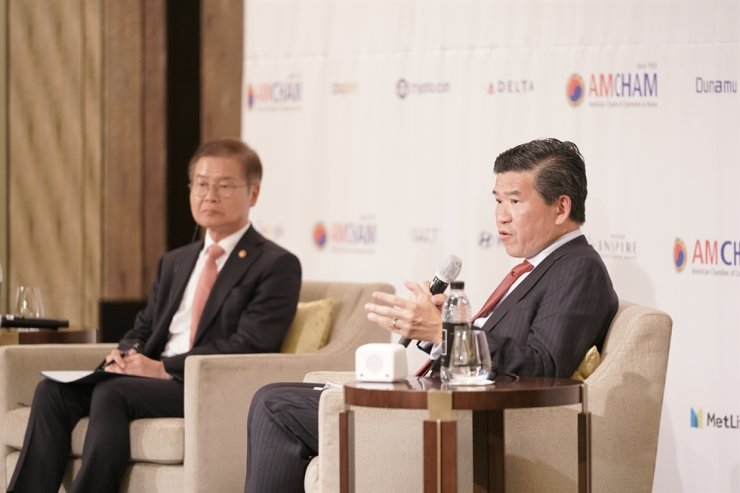
 >
>
>
>
2022.10.19
Labor minister lukewarm on US firms' requests to ease industrial accident law

By Park Jae-hyuk, The Korea Times - U.S. businesspeople in Korea received a lukewarm answer from the labor minister of the business-friendly Yoon Suk-yeol administration, in response to their requests to ease the Serious Accidents Punishment Act (SAPA), which can send a company's CEO to jail if a fatal industrial accident occurs at the company's workplace.
During Tuesday's luncheon
meeting between Minister of Employment and Labor Lee Jung-sik and members of
the American Chamber of Commerce in Korea (AMCHAM), the minister emphasized
that it is too early to talk about revising the law, which took effect just nine
months ago.
"The SAPA is intended
mainly to prevent frequent industrial accidents in Korea, rather than to punish
CEOs," he said. "CEOs do not need to worry about this law if they
fulfill their duty to check safety measures."
Although AMCHAM Chairman James
Kim told the minister that many U.S. businesspeople regard the Korean law as a
"very unique regulation," Lee said that the government is only able
to revise the enforcement decree within the minimum necessary level.
"We will try to make our
labor policies meet global standards, but Korea has had the world's worst level
of fatal industrial accidents," Lee said. "The country has become one
of the largest economies among the OECD countries, but it is still the
'republic of industrial accidents.'"
In response to a question about
easing the requirement for the 52-hour workweek, the minister noted that Korea
has also has the longest working hours among the OECD members, although he
added that the government has been seeking to allow some scheduling flexibility.
Regarding a question on the
possibility of differentiating minimum wages by industries, Lee said that labor
and management may discuss this issue early next year, once a labor policy
research institute finishes collecting data related to minimum wages.
He also said that the
government is not allowed to force businesses to replace their seniority-based
wage system with a performance-based payment system, as it basically depends on
agreements between labor and management. "A balanced approach is necessary
for labor policies," the minister said.
This was the first time in
eight years for the AMCHAM members to hold a meeting with Korea's labor
minister.
AMCHAM Chairman James Kim
appreciated that the Korean government has recognized the importance of inducing
foreign direct investment (FDI) and shown that it values stakeholder input from
the global business community. "AMCHAM stands ready to support the Korean
government in creating the best business environment in Asia so that Korea
could emerge as a regional business hub," he said.
Source: https://www.koreatimes.co.kr/www/tech/2022/10/419_338127.html?utm_source=na